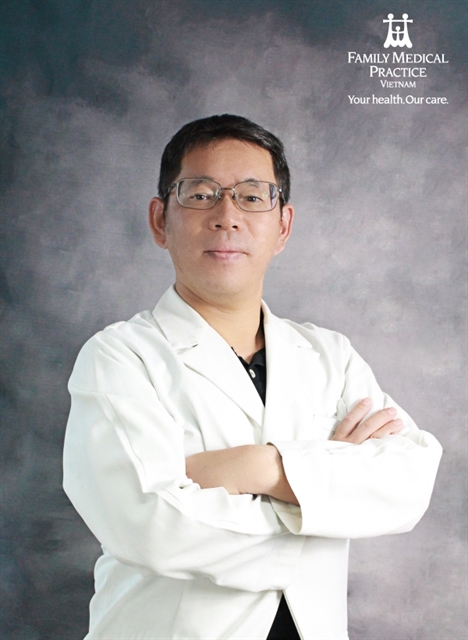 Life & Style
Life & Style

If you’re from a Western country and have lived most of your life there, you will probably never have come into contact with Helicobacter pylori. If you’re living in Việt Nam or Southeast Asia, however, your chances of being infected with this pathogen are greatly increased.

|
By Dr. Masato Okuda*
Around 50 years ago, every doctor in the world believed that no bacteria could survive in the hostile and acidic environment of the stomach. Eventually, two Australian doctors proved that there is a genus of bacteria – Helicobacter – that can survive in the stomach by neutralising the acid around themselves with a special enzyme. This important discovery rightly won them the Nobel prize, because it is now presumed that a very high proportion of stomach cancer is directly caused by Helicobacter pylori.
If you’re from a Western country and have lived most of your life there, you will probably never have come into contact with Helicobacter pylori. In those countries, cancer of the stomach is quite rare. If you’re living in Việt Nam or Southeast Asia, however, your chances of being infected with this pathogen are greatly increased. This represents a significant problem, because most Westerners (as well as local Vietnamese people) have never heard of this threat and never get tested for it.
In Việt Nam, the prevalence of Helicobacter pylori is not that high among people who were born before the American war. But those who were born during the war or later show a much higher prevalence, with many acquiring it from polluted water, as with food poisoning. These statistics suggest that before the war, hygiene in Việt Nam was perhaps better than it is now. It also means that there may be an increase in the incidence of stomach cancer in Việt Nam on its way.
So what does Helicobacter pylori do? Infected people are more likely to develop a peptic ulcer (an ulcer in the stomach or the duodenum) or stomach cancer. This doesn’t mean that you will surely develop an ulcer or cancer by having Helicobacter pylori. It just means that having this infection increases your risk. If you have a duodenal ulcer, there is a 90 per cent chance that you have Helicobacter pylori. In addition, within a week or two after infection, you may experience minor discomfort or even severe stomach pain.
The most accurate clinical test available for Helicobacter pylori is the breath test, which is the least invasive and most accurate of all the available methods. Our medical centre uses a BreathID breath test machine, which involves blowing into a couple of bags before drinking a special agent that reacts with Helicobacter pylori, delivering an immediate result. Everyone concerned about their exposure to Helicobacter pylori should take this simple test, especially those who have had symptoms of abdominal pain or discomfort.
After eradication, they should also undergo an endoscopy. The reason for this is that it’s important to assess how much accumulated damage you have sustained to the stomach lining, and whether or not you are already in a high-risk category for stomach cancer or have already developed it. In some countries it is considered a malpractice to eradicate Helicobacter pylori without running an endoscopy.
By looking at the stomach lining through the endoscope, you can see if blood vessels are visible through its lining, indicating some degree of atrophy or thinning. In more advanced cases, you can see strange growths – if you take cell samples from these areas, they look like cells from the intestine. These growths can be benign, but when they cross the border into malignancy, that is cancer. In the early stages we can remove it by endoscope, but at certain depths, it has to be a surgical operation.
Local people and foreigners who are living long-term in Asia should at least know that Helicobacter pylori is a risk and consider testing. Those from Western countries wouldn’t even have to worry about this at home, but by living here, they have a different risk. Family Medical Practice
*Dr. Masato Okuda works as a gastroenterologist for Family Medical Practice. Before coming to Việt Nam, Dr. Masato worked in Sumimoto Besshi Hospital in Japan for seven years and conducted gastroenterological endoscopy such as esophagogastroduodenoscopy, colonoscopy and ERCP. He has also worked as an oncologist in his field.
Family Medical Practice was the first foreign-owned primary healthcare provider in Việt Nam, and has consistently remained at the forefront of international-standard medicine since 1995. It offers extensive healthcare and emergency medical services nationwide to Vietnamese, expatriate and corporate customers.
For more advice on any medical topics, visit Family Medical Practice Hanoi at: 298 I Kim Mã, Ba Đình District. Tel: (024) 3843 0748. E: hanoi@vietnammedicalpractice.com.
FMP’s downtown Hồ Chí Minh location is: Diamond Plaza, 34 Lê Duẩn, District 1; 95 Thảo Điền, District 2. Tel: (028) 38227848. E: hcmc@vietnammedicalpractice.com
FMP Đà Nẵng is located at 96-98 Nguyễn Văn Linh, Hải Châu District, Đà Nẵng. Tel: (0236) 3582 699. E: danang@vietnammedicalpractice.com




